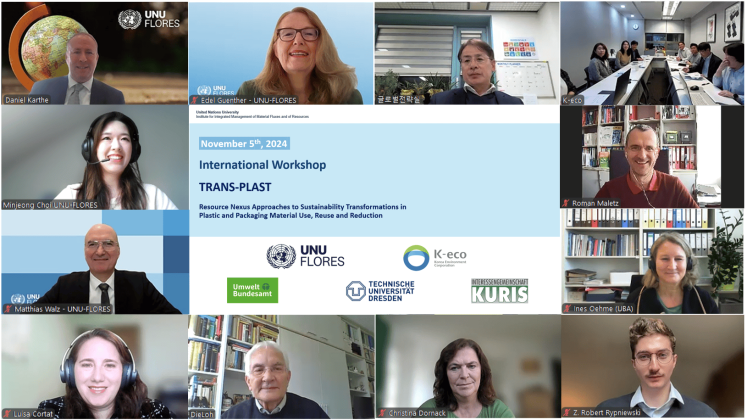On 5 November 2024, the United Nations University Institute for Integrated Management of Material Fluxes and Resources (UNU-FLORES) and its partner, the Korea Environment Corporation (K-eco), hosted the workshop of the 4th collaborative research project “TRANS-PLAST”. The project, titled "TRANS-PLAST: Resource Nexus Approaches to Sustainability Transformations in Plastic and Packaging Material Use, Reuse and Reduction" is a response to the global call for ending plastic pollution as underscored by the United Nations Secretary-General on World Environment Day 2023.
The workshop set out to facilitate a comprehensive discussion on recycling practices and the implementation of Extended Producer Responsibility (EPR) systems for sustainable plastic waste management. It aimed to bring together governmental, industrial, and educational perspectives, with a particular focus on the frameworks in Europe (Germany) and Korea.
The workshop was attended by a variety of partners included the Federal Environment Agency (Umweltbundesamt, UBA), Dresden University of Technology (Technische Universität Dresden, TUD), and Plastics Recycling Initiative of Saxony (Interessengemeinschaft Kunststoffrecycling-Initiative Sachsen e.V. (IG KURIS)).
Main Takeaways from Speaker Contributions
Prof. Daniel Karthe from the Trans-PLAST project shared insights on frameworks for managing plastic waste and recycling. Highlighting the full life cycle of plastics, he outlined the environmental implications of existing practices for handling waste plastic: recycling, landfill, incineration, or mismanagement. His presentation emphasized that the plastic pollution is not only a severe but also a ubiquitous problem that affects even the remotest areas of the planet. According to him, the UN system fully recognizes this threat, with one of the most prominent responses being a UN Environmental Assembly resolution to develop a global treaty on ending plastic pollution, which is supported by the European Union and its member states, but also by South Korea, which hosts the “International Negotiating Committee” discussions on the plastic treaty in November and December 2024.
Mr. Seung-keun Ko from K-eco discussed Extended Producer Responsibility (EPR) systems and future directions, noting that Korea, like the EU, aims to achieve carbon neutrality by 2050 through a circular economy that includes a significant EPR system plan. He presented insightful examples from South Korea how major brands have redesigned PET bottles so that they become easier to recycle, thereby partially compromising visual brand identities.
Dr. Dietmar Lohmann provided an overview of the work of Saxony’s Plastic Recycling Association. He outlined selected research projects that focus on establishing recycling loops and raising awareness among industry and the public. Dr. Lohmann addressed the recycling process itself, comparing technologies used and providing insights into the applications for recycled plastic materials. Dr. Lohmann highlighted that recycling is the right approach whenever there is a reasonable material reuse, and that alternative material uses should not be considered “downcycling” without carefully considering their purpose.
Prof. Edeltraud Guenther highlighted that plastic pollution is a priority topic for United Nations University, for which she sees an important role in academic capacity development, research and public awareness raising – but also in bringing together international stakeholders like for example K-eco and the Federal Environment Agency of Germany. Prof. Guenther used this opportunity to thank K-eco for their long-standing commitment of collaborating with UNU-FLORES, and the significant role that the reduction, reuse, recycling and recirculation of plastics has played in joint projects.
Narrowing in on Plastic Pollution Issues
The discussion on plastic pollution and strategies to prevent it involved several experts beyond the above-mentioned speakers. Germany’s Federal Environment Agency was represented by Dr. Ines Oehme, head of section Plastics and Packaging. Prof. Christina Dornack and Dr. Roman Maletz contributed on behalf of the Dresden University of Technology’s Institute of Waste Management and Circular Economy and their network of industry partners, including HolyPoly, a startup company in Dresden that as its vision sees “a world in which recycling plastics is the rule rather than the exception”. From the TRANS-PLAST project team, Ms. Minjeong Choi from UNU-FLORES brought in her experience from TRANS-PLAST and previous consultancy projects with K-eco, while Dr. Luisa Cortat from the Academy of European Law and student assistant Robert Rypniewski contributed valuable insights into recent developments of European legislation. Another crucial role was with Dr. Matthias Walz from UNU-FLORES who as Sustainability Finance expert addressed the relevance not only of market mechanisms but also of financial instruments that incentivize circular plastic use.
The expert discussion explored key aspects of plastic recycling, including the PET bottle collection and sorting process in Germany and Europe, chemical and thermal recycling methods, government subsidies for recycling companies, recycling of composite materials such as paper with plastic coating, industry compliance in using recycled materials, and consumer awareness about and acceptance of recycled plastics.
The workshop highlighted the importance of strong cooperation in the global community, involving the UN and member state governments, but also industry and educational institutions at all levels.
Looking towards Busan
The workshop coincides with global preparations for the fifth session of the Intergovernmental Negotiating Committee (INC-5) to develop an international treaty for ending plastic pollution, which will be held in Busan, Republic of Korea, on November 25, 2024, onwards. INC 5 Busan follows in the footsteps of four previous rounds of negotiations, the locations of which underline the global relevance of the problem: In 2022, INC 1 was held in Punta del Este, Uruguay, followed in 2022 by INC 2 in Paris, France and INC 3 in Kenya, Nairobi and in 2024 by INC 4 Ottawa, Canada. INC-5 is currently the final scheduled meeting, aiming at nothing less than a legally binding agreement on ending plastic pollution globally.
Participant List:
UNU-FLORES
Prof. Dr. Edeltraud Guenther, Director
Prof. Dr. Daniel Karthe, Head of Programme
Dr. Matthias Walz, Senior Scientist for Sustainable Finance
Ms. Minjeong Choi, Senior Research Assistant
Dr. Luisa Cortat, Consultant
Mr. Robert Rypniewski, Student Assistant
K-eco (Korea Environment Corporation)
Mr. Young-bong, YOON, Director, Office of the Global Strategy
Mr. Seok-jun, CHOI, Division Manager, Future Strategy Division of the Global Strategy Office
Ms. Jin-hyun, PARK, Manager, Future Strategy Division of the Global Strategy Office
Ms. Yun-seo, KIM, Manager, Future Strategy Division of the Global Strategy Office
Mr. Young-jin, CHO, Manager, Recycled Materials Management Center TF, Department of Municipal Waste Management
Mr. Seok-jae, LEE, Manger, Recycled Materials Management Center TF, Department of Municipal Waste Management
Mr. Seung-keun, KO, Manager, Packaging Material EPR Operation Division, Department of Municipal Waste Management
Ms. Kyung-jin, CHAE, Deputy General Manager, Product EPR Operation Division, Department of Municipal Waste Management
External Experts
Dr. Ines Oehme, Head of section, [Section III 1.6] Plastics and Packaging, Federal Environment Agency (Umweltbundesamt, UBA)
Prof. Dr.-Ing. habil. Christina Dornack, Head of the Institute of Waste Management and Circular Economy, Dresden University of Technology (TUD)
Dr. -Ing. Roman Maletz, Institute of Waste Management and Circular Economy, Dresden University of Technology (TUD)
Dr. rer. nat. Dietmar Lohmann, CEO, Plastics Recycling Initiative of Saxony (Interessengemeinschaft Kunststoffrecycling-Initiative Sachsen e.V. (IG KURIS))


